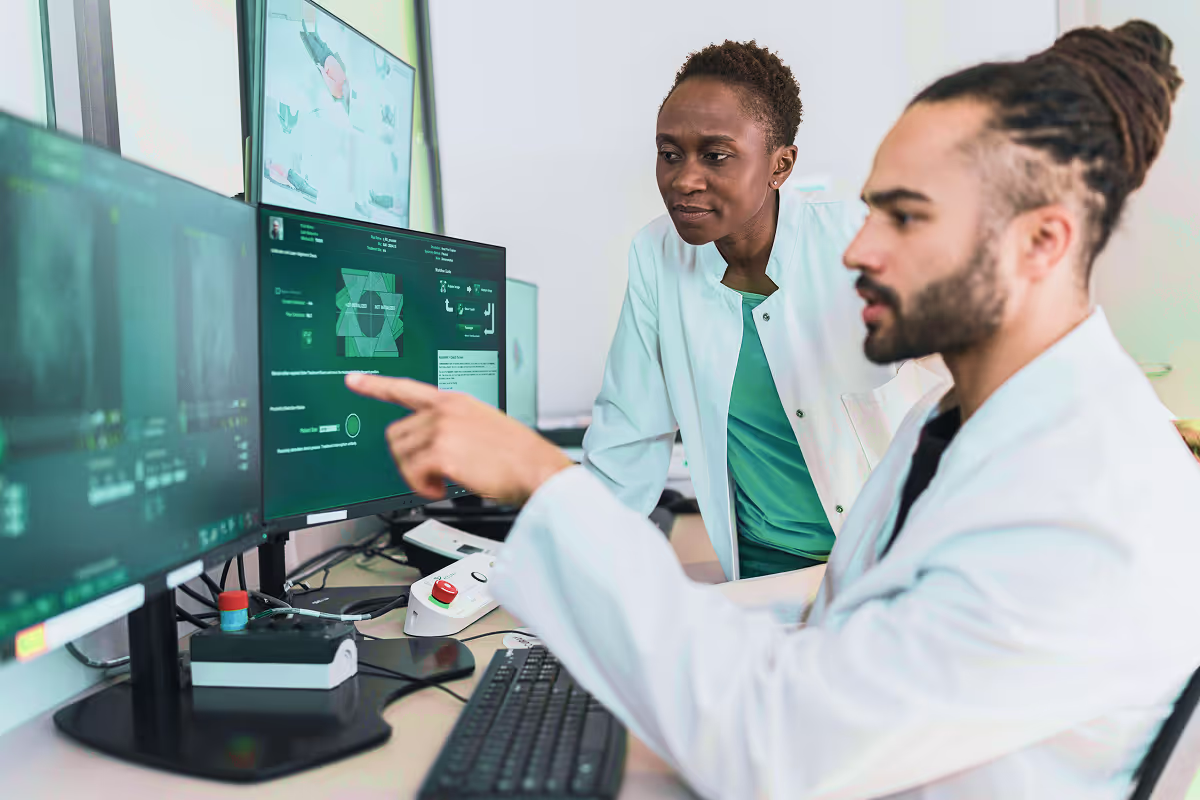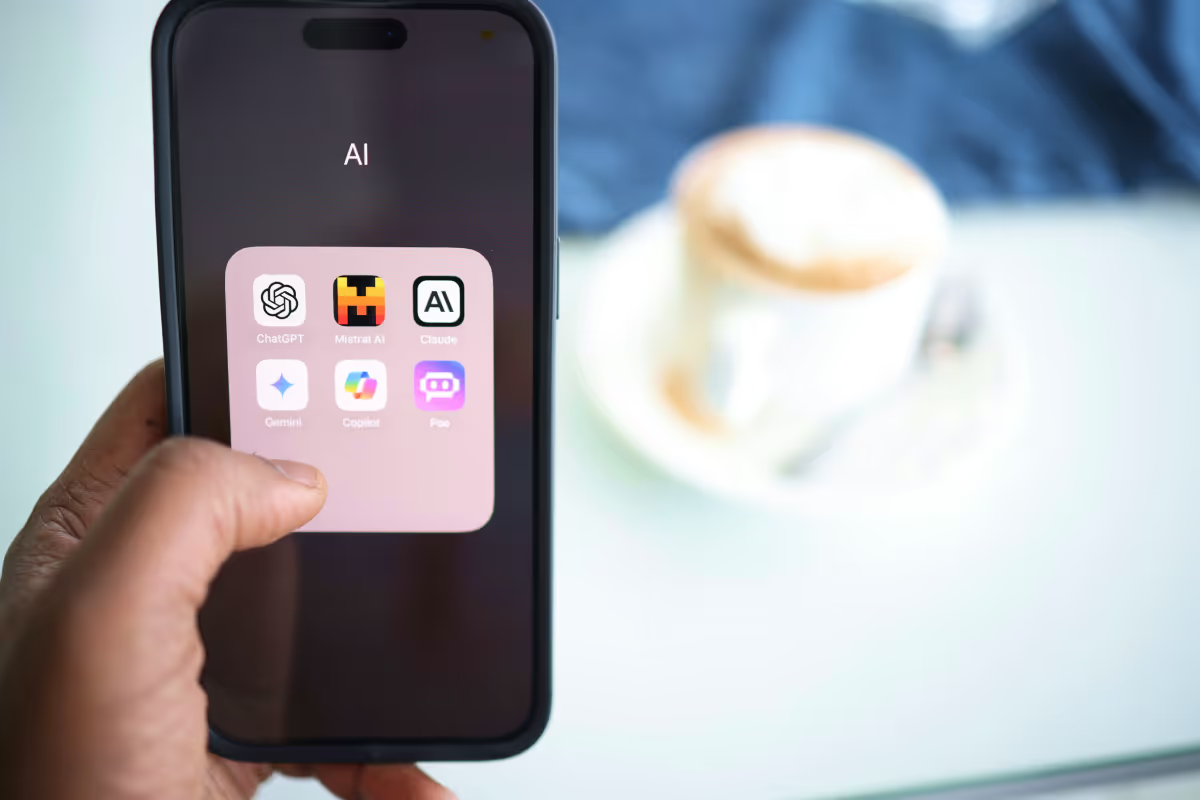Clinical documentation enables medical workflow, prompt treatments, and better patient outcomes. Over the years, clinicians and medical staff have tried various means to improve how they transcribe conversations with patients, code diagnosed pathological symptoms, and consolidate them to provide a better patient experience. Yet, clinicians remain heavily involved in administrative tasks documenting patient diagnoses, treatments, and patient outcomes.
So, healthcare providers seek ways to improve clinical documentation. Recent advancements in artificial intelligence hold the answer to accurate, efficient, and streamlined clinical documentation workflows. When implemented correctly, AI-based clinical documentation systems allow healthcare providers to minimize human intervention when transcribing medical notes.
Given that healthcare providers are under growing pressure to minimize costs, increase treatment efficiency, and comply with strict regulations, solution providers are capitalizing on the benefits of advanced AI technologies. About 75% of US hospitals are already using AI to process medical data.
As Uptech’s co-founder, I lead a team of IT and AI specialists who helped our clients embrace emerging technologies and navigate associated challenges. We constantly update our knowledge to stay up-to-date with the fast-changing AI environments. Our recent experience developing several generative AI-powered apps, including Hamlet, Dyvo for business, and Angler AI, will prove helpful in supporting your endeavor. Hence, I’m in a strong position to guide your effort in building an AI-based medical hospital documentation software.
In this article, I’ll share the challenges existing clinical documentation systems face and how AI can offer transformational changes.

The Problem With Clinical Documentation
Clinical documentation is resource-intensive, denying healthcare providers the expertise they need to improve patient outcomes. According to a study, doctors spent up to 55% of their time performing documentation tasks. Such time is better spent on diagnosis, treatment, and other primary roles that improve patient care quality.
- Overwhelming administrative tasks. Despite efforts to empower medical staff with electronic health data management solutions, physicians are burnt out with their administrative tasks. Instead of tending to patients, they transcribe patient conversations, code medical terms for claims submission, and ensure that the data collected comply with regulations.
- Incomprehensive records. The overwhelming demand for concise medical notes led to several methods that produced dissatisfactory results. For example, medical staff may use templated notes to document patient journeys. This leads to rigid note-taking that might not capture the actual conditions and care the patients receive.
- Over-reliant on medical scribes. Besides affecting patient experience, inaccuracies in medical records can also result in denied claims, affecting revenue for medical services rendered. Some healthcare providers resort to engaging human scribes to offload administrative burdens from physicians. While the move might provide temporary respite, healthcare providers require a more definitive solution to ensure accurate and efficient medical documentation.
Hence, healthcare providers anticipate AI's benefits in improving existing documentation workflows. AI augments digitalization efforts that medical establishments currently pursue, such as EHR, medical imaging, and telehealth services. With AI for medical documentation, you can bridge the gap preventing clinicians from delivering better patient care.
Looking for a professional dev team to build your healthcare product?
Uptech is one of the best healthcare software development companies. We provide a full-cycle healthcare software development services. Check them out and leverage our expertise!
What Types of Artificial Intelligence Can Improve Healthcare Documentation
Artificial intelligence (AI) broadly refers to software technologies that enable computer systems to mimic human decision-making processes. Recent breakthroughs in AI have led to the emergence of state-of-the-art algorithms that will allow accurate and efficient medical documentation. Specifically, these medical documentation AI technologies help overcome burnout and time wastage that clinicians face when transcribing, recording, and reviewing medical records.

Voice recognition
Voice recognition allows clinicians to navigate EHR data by identifying speech patterns and voice imprints unique to each individual. Instead of manually scribing medical notes, healthcare providers can embed voice recognition modules in devices such as phones, which automatically transcribe conversations in real time. When trained, advanced voice recognition systems can profile speeches to individual doctors, nurses, and other medical staff.
Natural language processing
Natural language processing (NLP) is a field in AI that enables computer systems to understand languages like humans do. When applied in medical documentation, NLP enables healthcare providers to automatically consolidate medical data from lab results, patient records, insurance claims, and other sources. An NLP-powered application can canvass massive volumes of documents and extract actionable insights – an incredibly difficult feat for human staff.
Machine learning
Machine learning equipped clinicians with predictive capabilities to make more accurate and timely decisions. ML-based documentation systems are trained to identify specific patterns in collected data and turn them into visualized forms to support treatment outcomes. For example, doctors can use ML to analyze a patient’s EHR to devise personalized treatment plans. Machine learning can also help healthcare providers spot medical coding errors, identify non-compliance, and improve medical procedures.
Want to learn more about using Generative AI in healthcare? Check our expert article.
AI in Clinical Documentation: 5 Solutions
Healthcare providers are racing against time to ensure clinical documentation ceases to be an obstacle that clinicians stumble over. AI enables transformational possibilities in how medical administrators and physicians manage EHR. AI promises answers to how to improve documentation in healthcare, starting from streamlining and automating medical record generation.
Instead of relying on manual data entry, medical documentation AI can support medical note-taking with real-time language understanding and processing. Besides, healthcare providers can integrate AI with existing medical systems and databases, enabling documentation systems to consolidate information from various sources. AI can also help clinicians make evidence-based by mining and analyzing EHR to compile highly accurate risk scores.
I share several possible AI use cases in healthcare documentation below.

Automate clinical note generation
AI-based medication documentation systems allow physicians to transcribe conversations they have with patients automatically. Instead of being overly reliant on human medical scribes, physicians use AI-enabled devices to extract and summarize key points in audio recordings for diagnosis, prescription, and other medical purposes. By combining NLP and speech recognition, doctors can produce accurate medical transcription efficiently without manual intervention.
Enable ambient clinical intelligence
Ambient clinical intelligence (ACI) is an AI technology that automatically captures critical medical information from patient-physician interactions. The technology applies NLP and generative AI models to analyze conversations in apps and telehealth devices to generate a concise clinical note. Designed to be non-intrusive, the ACI module runs silently in the background, allowing natural and unobstructed medical consultations.
Ensure medical coding compliance
Clinicians work tirelessly to transcribe and ensure medical terms in bills and patient records comply with international standards like the International Classification of Diseases (ICD). Yet, medical coding mistakes are inevitable, hampering medical claims and resulting in tedious reworks. AI technologies, specifically NLP and machine learning, prove helpful in automatically transcribing, coding, and cross-checking medical terms with regulatory standards. This allows healthcare providers to comply with billing best practices and submit claims with strong confidence.
Improve patient risk assessment
Besides code compliance, AI is equally helpful in ensuring patients receive treatments appropriate for their medical conditions. By incorporating NLP and machine learning in medical documentation, AI software can eliminate ambiguous interpretations of pathological symptoms when administering treatment. Clinical AI software can navigate variations in medical terminology and map patient charts against hierarchical condition category (HCC) coding. Doing so allows physicians to plan subsequent treatment more effectively and provides insurers clarity of the patient’s risk factors.
Provide actionable clinical insights
AI-based software goes beyond improving clinical documentation. By leveraging deep learning machine learning algorithms, clinicians can analyze medical records for actionable insights. For example, AI can detect correlated health patterns that escape human eyes. Early detection by AI-based clinical documentation solutions allows doctors to intervene promptly and accelerate patient recovery rates.

Privacy Concerns of Implementing AI In Healthcare Documentation
Despite AI's immense potential, healthcare stakeholders are cautious about implementing AI at scale, including for clinical documentation. Being a tightly regulated industry, healthcare providers must ensure patients’ privacy is always protected when using AI. At present, concerns about bias, inaccuracies, and data security hamper optimism surrounding AI-based solutions.
Generative AI, pivotal for developing advanced documentation software, is subjected to bias and performance issues. Depending on how the underlying AI model was trained, it might struggle to remain consistently fair when inferencing. For example, the medical AI app may score patients' risk differently based on gender. Generative AI models might also hallucinate, providing factually incorrect responses that could negatively affect patient outcomes.
Given the implications of AI-driven systems on patient safety, legislative bodies have called for a more responsible approach to implementing generative AI in healthcare. The World Health Organization, in a recent statement, called for stakeholders to balance benefits with risk assessment when introducing AI to healthcare practices. This allows patients to receive safe, transparent, and more explainable AI-assisted care.
Echoing such calls is Responsible AI Institute’s (RAI) recent move to establish a consortium to regulate AI usage in privacy-sensitive industries, including healthcare. Led by corporate leaders, academia, and governments, RAI provides independent assessments that help medical AI providers build and deliver safer AI systems to the public.
To learn more about AI Governance for healthcare, check out article.
5 Ways to Improve Clinical Documentation with AI
Implementing AI documentation systems in healthcare requires a delicate balance between functionality and physician needs. Doctors and medical staff value transparency, evidence-based and autonomy in their decisions. Therefore, I recommend several considerations when you build an AI medical documentation system.

1. Adopt explainable AI
Generative AI is designed similarly to black boxes, where machine learning engineers face difficulty explaining reasoning influencing the algorithm's decisions. This might discourage AI use cases in healthcare as physicians seek trustworthy solutions. Therefore, adopt explainable AI frameworks to understand how the system behaves. Use independent benchmarks to encourage physicians to adopt trustworthy AI for medical use cases.
2. Enable information accessibility
Physicians need immediate access to supplementary information that helps them make decisions when dispensing medical treatments. The clinical documentation app you develop must consolidate EHR from existing systems and make them readily available to the medical team. Doctors should be able to retrieve the information they need without making separate requests on another system.
3. Support clinical validation
When used to diagnose patients, AI medical documentation systems must be able to correlate pathological discoveries to produce convincing suggestions for medical practitioners. For example, the solution combs through a patient’s medical records to ensure they are treated for symptoms discovered in lab results. The AI documentation system applies NLP and deep learning to confirm that the medical terms are consistent and alert physicians of discrepancies.
4. Intuitive integration
Be mindful when integrating the AI medical documentation solution with existing medical systems. Medical staff are accustomed to the systems they’ve been using. Introducing additional steps that take considerable learning time will overwhelm physicians, leading to increased frustration. Instead, design the system to fit into existing workflows to simplify documentation.
5. Allow rooms for customization
Clinical documentation follows a considerable standard process of recording patient diagnoses, treatments, and outcomes. Therefore, standardizing the AI system’s workflow to ensure documentation consistency makes sense. Yet, each medical institution is governed by different procedures, which require flexibility in accommodating minor variations. Balancing customization and standardization helps your AI solution meet complex healthcare documentation requirements.
How Can Uptech Help?
Uptech is an international app development company helping clients integrate emerging AI technologies into their solutions. With proven field experience, our multi-disciplinary team has consistently delivered commendable results in projects we undertake. This includes several generative AI solutions we developed and integrated recently.
For example, our team built Hamlet, a cloud-based solution that allows users to summarize text documents with generative AI. In this project, we use a large language model to extract key textual data from documents and generate concise summaries. We could do the same with your AI-based healthcare documentation system.

Besides AI, regulatory compliance is instrumental when developing healthcare applications. Our work developing a mental healthcare app for the US market demonstrates our capability to produce HIPAA-compliant solutions. We know that data security takes priority, and we applied stringent measures to develop a resilient app.

Uptech is more than a typical software development studio. We are a partner that our clients trust to bring their products to the market on time and at a reasonable cost. Learn more about the AI development services we offer here.

Final Thoughts
Physicians have long struggled with healthcare documentation tasks, hampered by tedious data entry tasks and overwhelming workloads. AI offers exciting opportunities to streamline clinical documentation, allowing medical staff to devote their attention to improving patient outcomes.
I’ve highlighted how AI can reshape medical documentation workflow, including automating record transcription, streamlining medical coding, and deriving actionable clinical insights. Several challenges might hinder your efforts in developing and marketing clinical AI solutions, and I hope my recommendations help overcome them.
Talk to our Biz Dev Manger to learn how we can develop safe, functional, and scalable medical AI solutions for you.




































































































